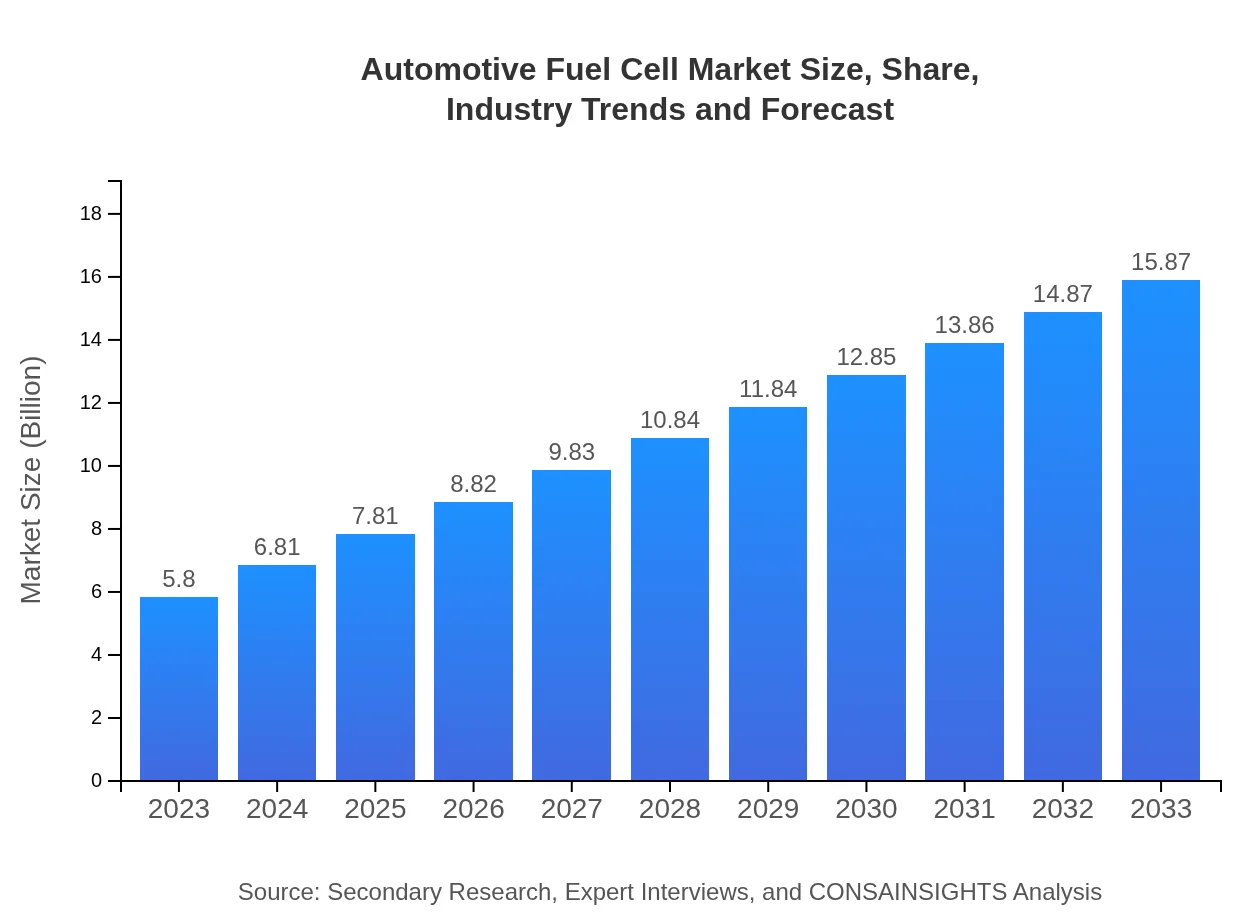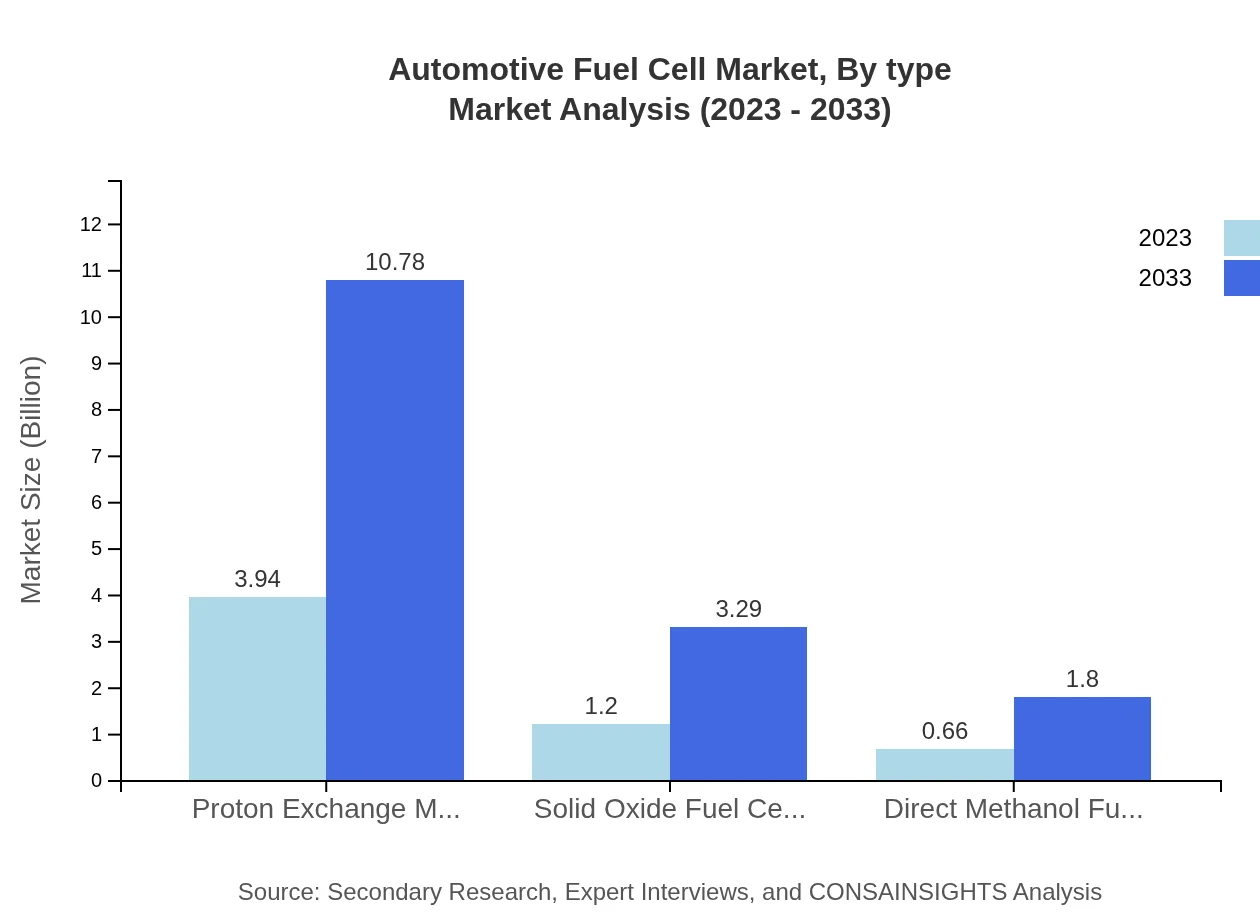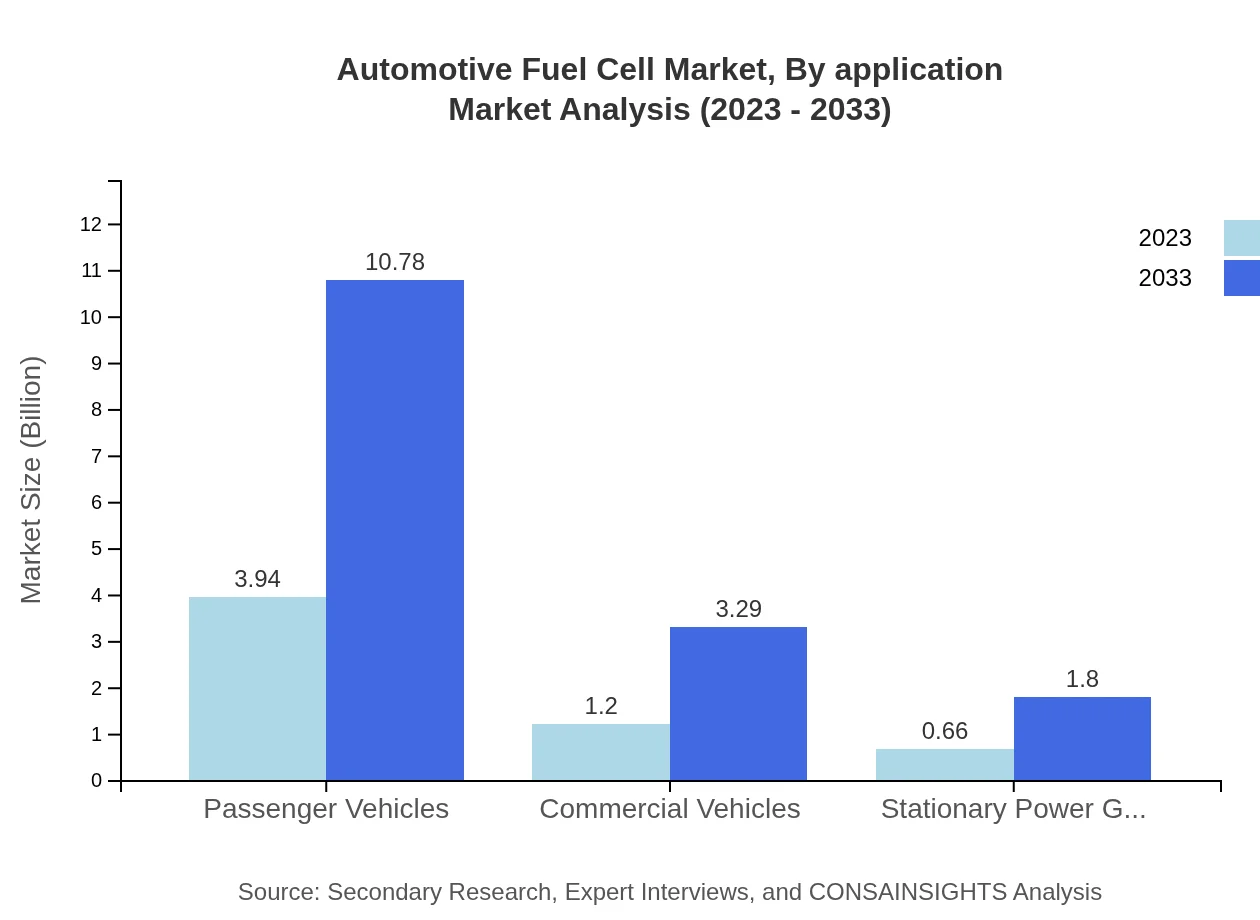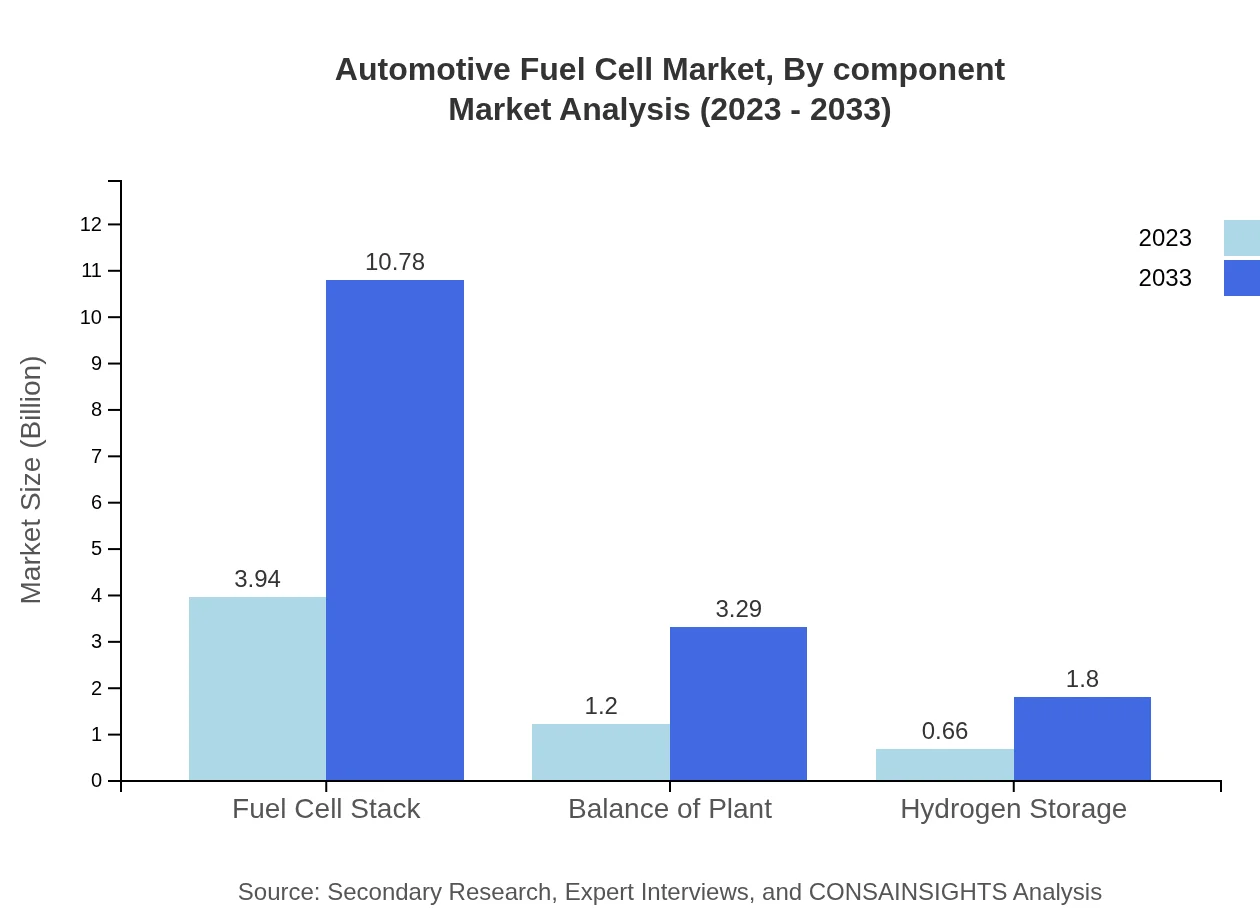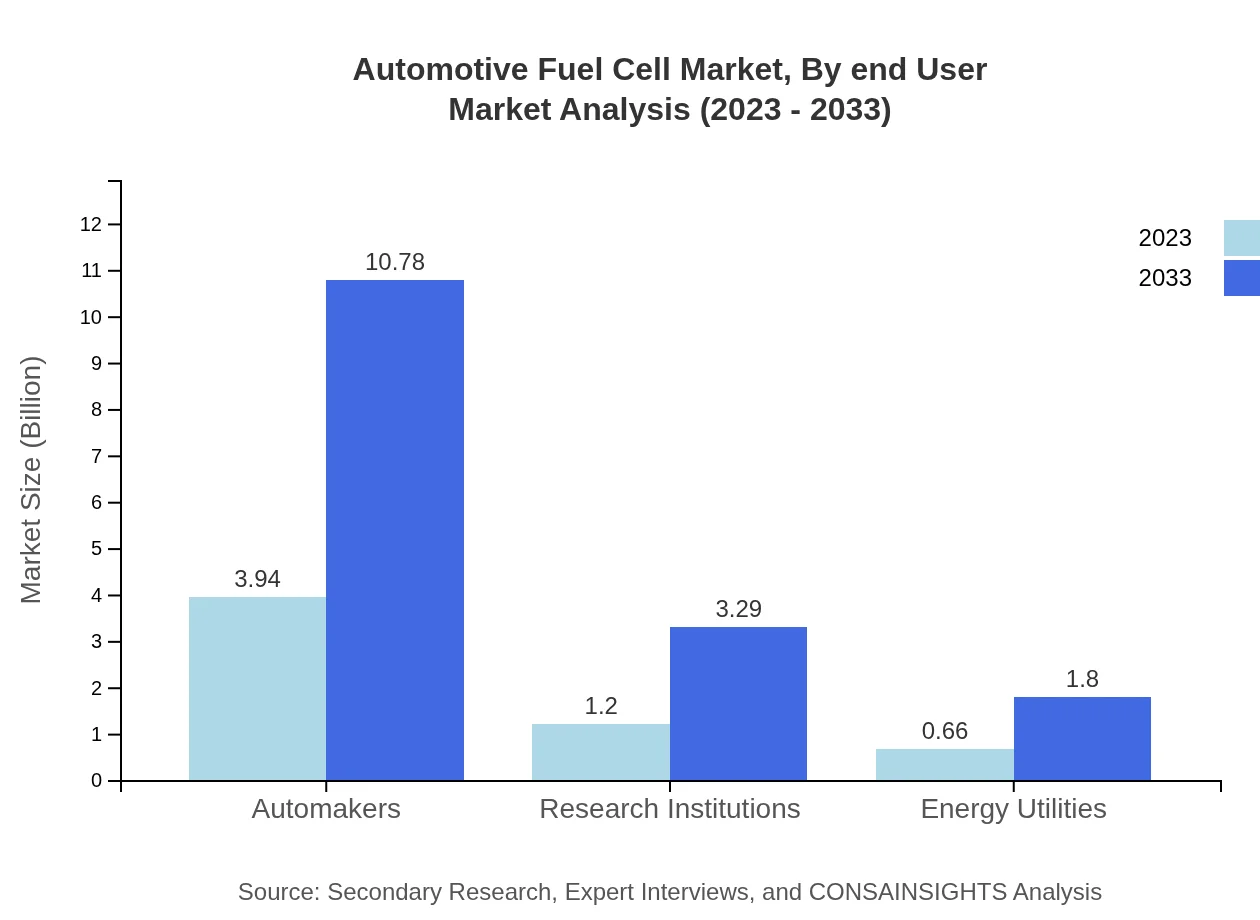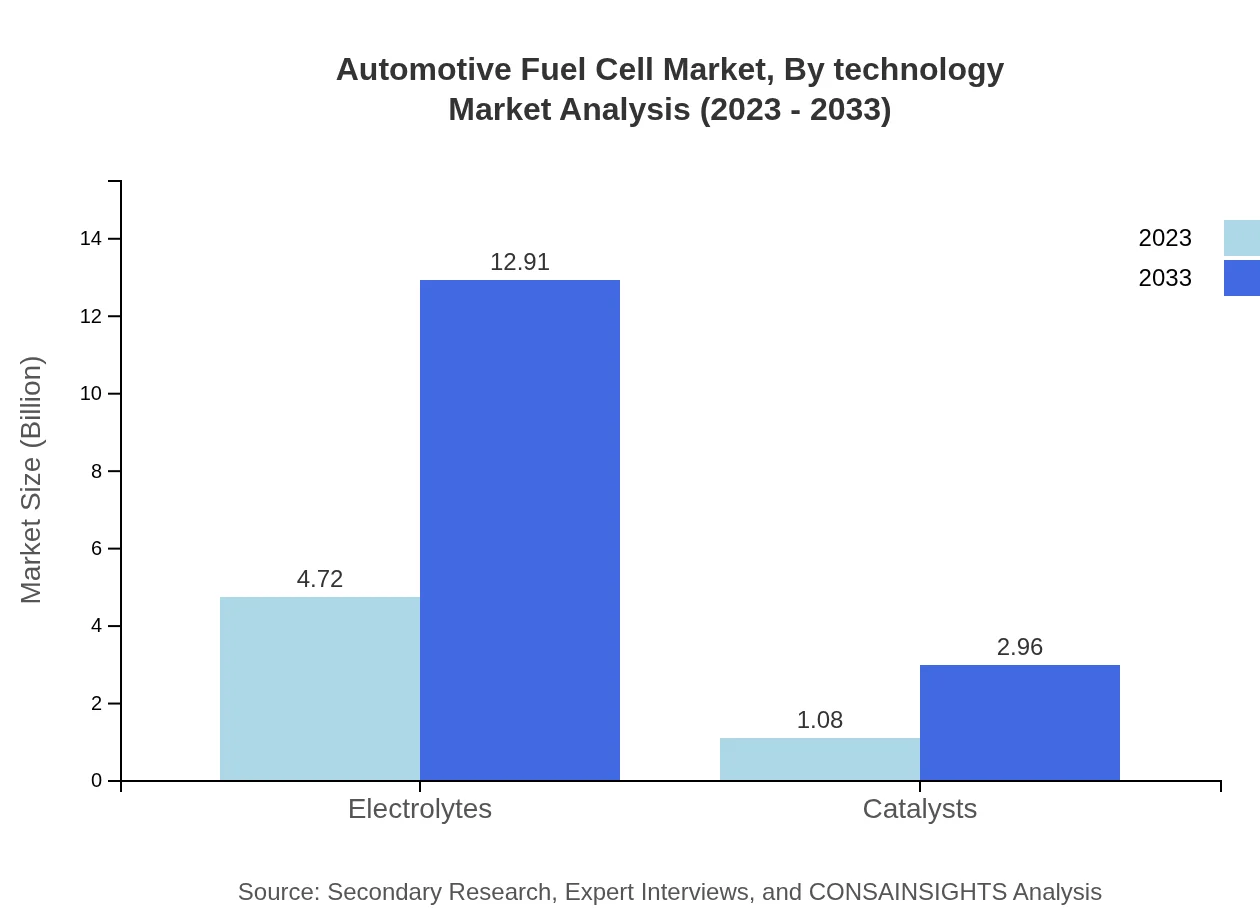Automotive Fuel Cell Market Report
Published Date: 22 January 2026 | Report Code: automotive-fuel-cell
Automotive Fuel Cell Market Size, Share, Industry Trends and Forecast to 2033
This detailed market report covers the Automotive Fuel Cell sector from 2023 to 2033, providing insights into market dynamics, regional analysis, industry trends, and forecasts. It aims to offer valuable data for stakeholders and decision-makers in the automotive and energy sectors.
| Metric | Value |
|---|---|
| Study Period | 2023 - 2033 |
| 2023 Market Size | $5.80 Billion |
| CAGR (2023-2033) | 10.2% |
| 2033 Market Size | $15.87 Billion |
| Top Companies | Toyota Motor Corporation, Hyundai Motor Company, Ballard Power Systems, Plug Power Inc., FuelCell Energy, Inc. |
| Last Modified Date | 22 January 2026 |
Automotive Fuel Cell Market Overview
Customize Automotive Fuel Cell Market Report market research report
- ✔ Get in-depth analysis of Automotive Fuel Cell market size, growth, and forecasts.
- ✔ Understand Automotive Fuel Cell's regional dynamics and industry-specific trends.
- ✔ Identify potential applications, end-user demand, and growth segments in Automotive Fuel Cell
What is the Market Size & CAGR of Automotive Fuel Cell market in 2023?
Automotive Fuel Cell Industry Analysis
Automotive Fuel Cell Market Segmentation and Scope
Tell us your focus area and get a customized research report.
Automotive Fuel Cell Market Analysis Report by Region
Europe Automotive Fuel Cell Market Report:
Europe demonstrates substantial growth potential in the Automotive Fuel Cell market, with an increase from $1.63 billion in 2023 to $4.45 billion by 2033. Stringent regulations on emissions and investments in hydrogen technologies in countries like Germany, France, and the Netherlands position Europe as a leader in fuel cell vehicle deployment.Asia Pacific Automotive Fuel Cell Market Report:
In Asia Pacific, the Automotive Fuel Cell market is anticipated to grow from $1.07 billion in 2023 to $2.94 billion by 2033. Countries like Japan, South Korea, and China are leading in fuel cell technology implementation due to government incentives and a strong commitment to green energy initiatives. The presence of major automotive manufacturers further accelerates market adoption.North America Automotive Fuel Cell Market Report:
North America is a key market for Automotive Fuel Cells, expected to increase from $2.25 billion in 2023 to $6.15 billion by 2033. The demand is driven by significant investments from both the public and private sectors in hydrogen infrastructure, alongside ongoing advancements in fuel cell technologies led by major automotive players in the U.S. and Canada.South America Automotive Fuel Cell Market Report:
The South American market for Automotive Fuel Cells is relatively nascent, projected to grow from $0.15 billion in 2023 to $0.42 billion by 2033. Brazil is the primary country focusing on developing hydrogen infrastructure, supported by government policies aimed at sustainability and exploration of alternative energy sources.Middle East & Africa Automotive Fuel Cell Market Report:
The Automotive Fuel Cell market in the Middle East and Africa is projected to expand from $0.70 billion in 2023 to $1.91 billion by 2033. The focus is primarily on research and pilot projects aimed at proving the feasibility of fuel cell technology, especially in markets like South Africa, which is exploring various sustainable energy options.Tell us your focus area and get a customized research report.
Automotive Fuel Cell Market Analysis By Type
The Automotive Fuel Cell market can be divided into several types, including Proton Exchange Membrane Fuel Cells (PEMFC), Solid Oxide Fuel Cells (SOFC), and Direct Methanol Fuel Cells (DMFC). By 2033, PEMFC is expected to dominate the market with a share of approximately 67.92%, showcasing its significance in the automotive sector due to its efficiency and suitability for vehicle applications. SOFC and DMFC are also growing, focusing on specific applications and efficiency improvements.
Automotive Fuel Cell Market Analysis By Application
The primary applications of Automotive Fuel Cells include passenger vehicles, commercial vehicles, and stationary power generation. Passenger vehicles occupy a major share, reflecting the industry's push towards developing fuel-efficient and zero-emission vehicles. Commercial vehicles are also gaining traction, supported by increasing demand for hydrogen fuel cell trucks and buses aimed at providing sustainable public and freight transport solutions.
Automotive Fuel Cell Market Analysis By Component
Key components of Automotive Fuel Cells include Fuel Cell Stacks, Electrolytes, Catalysts, Balance of Plant, and Hydrogen Storage systems. By 2033, Fuel Cell Stacks are projected to hold a significant market share of approximately 67.92%, while Electrolytes will represent around 81.35%. These components are critical for the functionality and efficiency of fuel cells in automotive applications.
Automotive Fuel Cell Market Analysis By End User
The end-users of Automotive Fuel Cells are primarily categorized into Automakers, Research Institutions, and Energy Utilities. Automakers are projected to dominate the market with a 67.92% share in 2033 due to their role in incorporating fuel cell technology into their vehicles. Research Institutions contribute by advancing the understanding and development of fuel cell technologies, while Energy Utilities focus on integrating hydrogen into their energy solutions.
Automotive Fuel Cell Market Analysis By Technology
Technological advancements play a crucial role in the Automotive Fuel Cell industry. Innovations in catalysts and materials are leading to improved performance and reduced costs. Research is focusing on enhancing the durability of fuel cells, which is essential for their adoption in commercial applications. Additionally, automated driving technologies combined with fuel cell vehicles present exciting opportunities for future developments.
Automotive Fuel Cell Market Trends and Future Forecast
Tell us your focus area and get a customized research report.
Global Market Leaders and Top Companies in Automotive Fuel Cell Industry
Toyota Motor Corporation:
Toyota is a pioneer in fuel cell technology with its MIRAI model, leading the way in commercializing hydrogen fuel cell vehicles.Hyundai Motor Company:
Hyundai is at the forefront of the fuel cell market, focusing on developing innovative fuel cell solutions across various segments, including commercial transport.Ballard Power Systems:
Ballard specializes in proton exchange membrane fuel cell technology, providing solutions for heavy-duty vehicles and portable power applications.Plug Power Inc.:
Plug Power focuses on hydrogen fuel cell systems for material handling and stationary power, making significant strides in the commercialization of fuel cells.FuelCell Energy, Inc.:
FuelCell Energy offers efficient fuel cell power plants using carbonate fuel cell technology for renewable energy generation.We're grateful to work with incredible clients.









FAQs
What is the market size of automotive fuel cell?
The automotive fuel cell market is valued at approximately $5.8 billion in 2023, with a projected compound annual growth rate (CAGR) of 10.2%, highlighting significant growth potential in the upcoming decade.
What are the key market players or companies in this automotive fuel cell industry?
Key players in the automotive fuel cell market include established automotive manufacturers like Toyota, Honda, Hyundai, and companies focused on fuel cell technology such as Ballard Power Systems and Plug Power, each contributing to innovation and market growth.
What are the primary factors driving the growth in the automotive fuel cell industry?
The growth of the automotive fuel cell industry is driven by increasing demand for eco-friendly vehicles, advancements in fuel cell technology, and government regulations promoting zero-emission vehicles, alongside rising investments in hydrogen infrastructure.
Which region is the fastest Growing in the automotive fuel cell market?
North America is the fastest-growing region in the automotive fuel cell market, with a market size projected to increase from $2.25 billion in 2023 to $6.15 billion by 2033, fueled by supportive government policies and a growing interest in hydrogen vehicles.
Does ConsaInsights provide customized market report data for the automotive fuel cell industry?
Yes, ConsaInsights offers customized market report data tailored to the specific needs and interests of clients in the automotive fuel cell industry, ensuring relevant insights and analysis.
What deliverables can I expect from this automotive fuel cell market research project?
Deliverables from this market research project include detailed market analysis, growth forecasts, competitive landscape reports, and insights on key trends, segments, and region-specific data for the automotive fuel cell market.
What are the market trends of automotive fuel cell?
Current trends in the automotive fuel cell market include increased investment in hydrogen infrastructure, technological advancements in fuel efficiency, and a shift towards sustainable transportation solutions, reflecting a global commitment to reducing carbon emissions.

